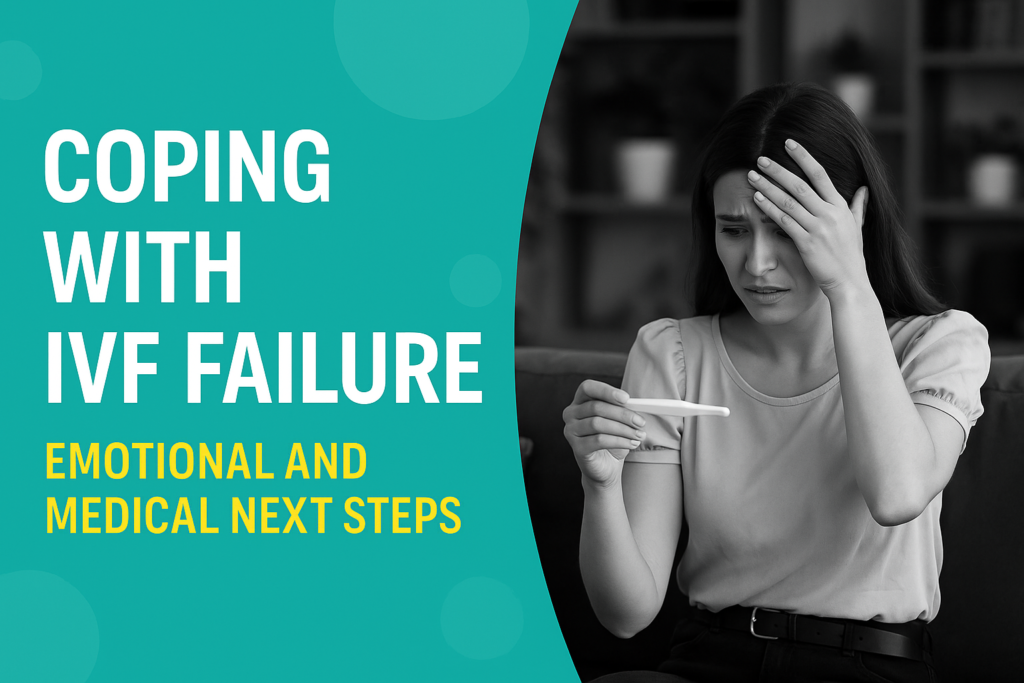Introduction: When IVF Doesn’t Go as Planned
In vitro fertilization (IVF) is a journey that fills you with hope, expectation, and most times, emotional involvement. Yet when a cycle crashes, the disheartenment may be devastating. If you are having a tough time knowing what to do next, don’t worry, you are not alone. Numerous couples undergo IVF failure prior to finally being successful.
In this blog post, we’ll guide you through managing IVF failure both emotionally and medically. You’ll discover what to do next, how to deal with grief, and how to prepare—mentally and physically—for what comes next.
Understanding IVF Failure
What Is IVF Failure?
IVF failure is the failure of an IVF cycle, in that:
- No good embryos were produced or transferred
- The embryo did not implant
- There was a miscarriage following implantation
Why Does IVF Fail?
There are a number of reasons why IVF might not lead to pregnancy:
- Poor egg or sperm quality
- Embryo abnormalities
- Uterine conditions (e.g., fibroids, endometrial problems)
- Hormonal imbalances
- Immune system or genetic issues
To learn more about the IVF process and complications, click on the Ayuh Fertility Centre website.
Emotional Impact of IVF Failure
Common Emotional Responses
Failure with IVF can provoke a variety of emotions:
- Grief and loss
- Anxiety or panic attacks
- Depression
- Anger and frustration
- Social withdrawal
Why Emotional Coping Matters
Your emotional health is as crucial as your physical health when undergoing fertility treatment. Denying grief can result in burnout and prevent subsequent IVF success.
Emotional Coping After IVF Failure
1. Accept Your Feelings
Don’t downplay your experience. IVF failure is a true loss. Permit yourself to mourn.
2. Get Support
- Speak with a fertility counselor sensitive to the psychological effects of infertility.
- Join a support group, either in person or online.
- Lean on your partner and maintain open communication.
3. Take Time to Heal
Avoid rushing into another cycle. Take a break if needed to recover emotionally.
4. Avoid Blame
Infertility is a medical condition, not a personal failure. Neither partner is at fault.
5. Practice Self-Care
- Eat well
- Get enough sleep
- Exercise regularly
- Try relaxation techniques like yoga or meditation
6. Focus on Positivity and Resilience
- Reflect on the progress you’ve made
- Celebrate the small wins
- Stay connected with others who understand
For emotional and psychological counseling, call Ayuh Fertility Centre to talk with a seasoned counselor.
Medical Actions to Take When IVF Fails
1. Book a Follow-Up Consultation
Consult with your fertility expert to discuss the IVF cycle in detail. Some of the important subjects may be:
- Embryo quality and grading
- Hormonal levels
- Response to ovarian stimulation
- Uterine receptivity
2. Conduct Further Diagnostic Tests
Depending on your consultation, your physician might suggest:
- Hysteroscopy or ultrasound to check the uterus
- Karyotyping or genetic testing
- Thrombophilia screening
- Immune system assessments
3. Assess Sperm and Egg Quality
- Male partners can require a DNA fragmentation test
- Women can benefit from anti-Mullerian hormone (AMH) testing
4. Consider Preimplantation Genetic Testing (PGT)
PGT can determine chromosomal defects in embryos prior to transfer, minimizing the chances of implantation failure.
5. Modify Protocols
Your fertility team may alter:
- Medication dosages
- Stimulation schedules
- Embryo transfer protocols (fresh versus frozen)
Discuss advanced fertility testing and treatment options at Ayuh Fertility Centre.
Planning Your Next IVF Cycle
If you choose to go for another IVF cycle, follow these steps:
1. Optimize Health Before Treatment
- Eat a balanced diet
- Keep a healthy BMI
- Stop smoking and reduce alcohol
- Optimize stress levels
2. Personalize Your Treatment Plan
Each body is distinct. Collaborate with your physician to develop an individualized approach based on your distinct fertility picture.
3. Assess Financial and Emotional Readiness
Ensure that you are financially and emotionally ready for the next cycle.
4. Look into Alternative Options
- Donor egg or sperm use
- Surrogacy
- Adoption
- Child-free existence
Discussing with Your Partner After IVF Failure
Failure of IVF can strain a relationship. Consider these tips for staying together:
Practice Open Communication
- Share thoughts and feelings
- Listen without Judgment
Set Boundaries Together
- Agree how to respond to questions from relatives and friends
- Make room to heal
Visit Counseling as a Couple
Marriage counseling may enhance coping techniques and bond the two of you.
When to Seek Psychological Assistance
You might be helped by talking to a mental health clinician if you:
- Feel persistently sad or hopeless
- Struggle with sleeping or eating
- Avoid being around people
- Feel stuck or can’t move forward
Ayuh Fertility Centre offers access to trained fertility counselors. Book an appointment to get supportive guidance.
FAQs About IVF Failure
Q: How many failed IVF cycles are normal?
A: Most couples try 2–3 cycles before it works. But each situation is unique.
Q: Can I change clinics after IVF failure?
A: Yes. A fresh perspective or different approach may increase your chances.
Q: Does emotional stress really affect IVF outcomes?
A: Chronic stress can negatively impact hormone regulation and overall fertility.
Q: Are there treatments to improve egg quality?
A: While age-related decline can’t be reversed, supplements like CoQ10 and lifestyle changes may help.
Conclusion: Healing and Hope After IVF Failure
IVF failure is acutely painful, but it is not the end of your fertility journey. If you understand why it has happened, if you spend some time grieving, and if you work closely with your fertility care team, you can regain control and hope.
Your next move might be further testing, a change in strategy, or even considering other routes to parenthood. Whatever you decide, the path is yours to create—and you don’t have to do it alone.
Contact Ayuh Fertility Centre to talk through your next steps, and discover our full range of fertility care services for tailored support.


